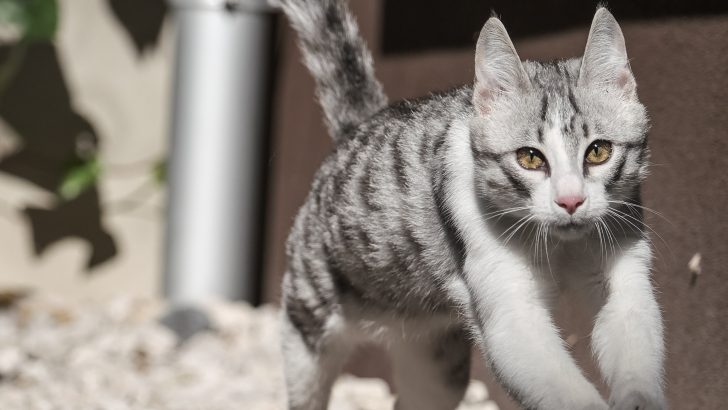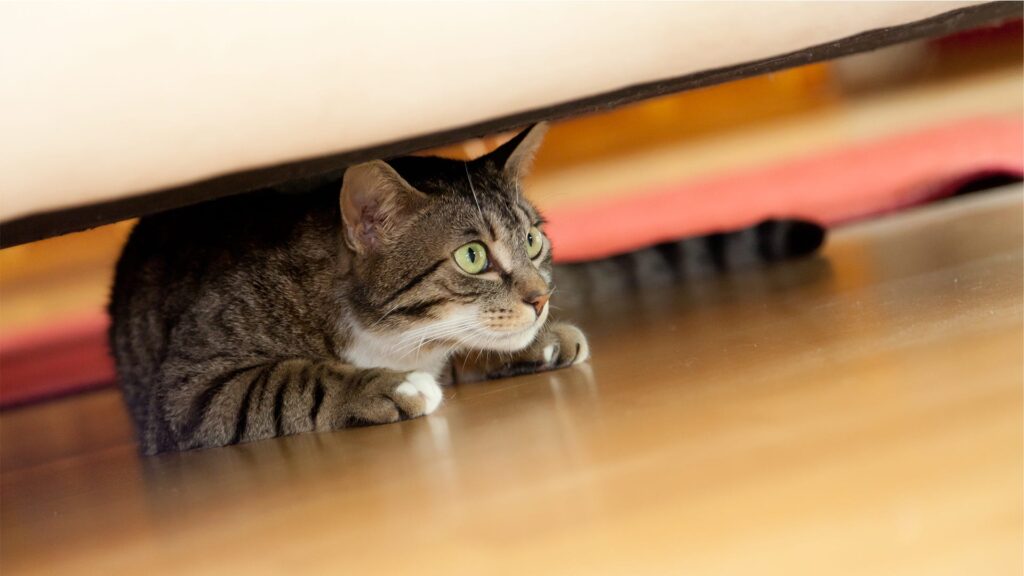Cats hate sounds such as loud music or vacuum cleaners. Read on for 23 sounds cats dislike and how to handle them.
Cats are known for their sensitivity to sound, and there are certain noises that can really grate on their nerves. From loud music to household appliances like vacuum cleaners, these sounds can make cats anxious or upset. Being aware of these noises can help you create a calm and peaceful environment for your feline friend.
We will explore 23 sounds that cats hate to hear and provide tips on how to handle them. By understanding these sounds and taking steps to minimize their impact, you can ensure that your cat feels safe and comfortable in your home.
Contents
- 1 The Sensitivity Of A Cat’s Ears
- 2 Unveiling The 23 Sounds Cats Hate
- 3 Vibrating Appliances And Machinery
- 4 High-pitched Noises: Poking At Their Ears
- 5 Household Sounds Related To Territorial Issues
- 6 Exploring Outdoor Sounds
- 7 Wildlife Sounds: From Fascination To Fear
- 8 Unexpected Sounds During Special Occasions
- 9 Frequently Asked Questions On 23 Sounds Cats Hate To Hear: Be Prepared For Surprises
- 10 Conclusion
The Sensitivity Of A Cat’s Ears
Cats have extremely sensitive hearing that is far superior to humans. Understanding their hearing range is crucial for providing a comfortable and stress-free environment for our feline friends.
The hearing range of cats is approximately 48-85,000 Hz, which is significantly wider than that of humans (20-20,000 Hz). This means that cats can hear sounds that are beyond our range of hearing and can detect even the slightest variations in frequency.
Cats have evolved to rely heavily on their hearing for various purposes, such as hunting, communication, and self-defense. This heightened sensitivity allows them to detect prey even in the dark and communicate through vocalizations that include purring, meowing, hissing, and growling.
| Noise | Effect on Cats |
|---|---|
| Loud music | Causes stress and anxiety |
| High-pitched sounds | Can lead to discomfort and irritation |
| Fireworks | Extremely distressing, can trigger fear and hiding behavior |
| Vacuum cleaner | Provokes anxiety and may cause cats to flee |
| Dog barking | Can cause fear and stress, affecting their overall well-being |
Given their sensitive nature, it is important to minimize exposure to loud noises that can harm their delicate ears and cause them unnecessary stress. As responsible cat owners, we should be aware of sounds cats hate to hear and create a calm and quiet environment where they can feel safe and secure.
Unveiling The 23 Sounds Cats Hate
Unveiling the 23 Sounds Cats Hate is crucial for cat owners and enthusiasts to ensure their beloved feline friends remain calm and stress-free. A comprehensive list of these sounds helps to understand their potential impact on cats. Exploring each sound individually sheds light on the reasons behind their aversion.
Cats are renowned for their sensitive hearing, and certain noises can be distressing for them. Some common sounds that cats generally dislike include loud or high-pitched noises such as vacuum cleaners, thunderstorms, fireworks, and crying babies. These sounds can cause anxiety and fear in cats, leading to behavior changes.
Other sounds that cats may find unpleasant include doorbells, car alarms, sirens, yelling or shouting, and certain musical instruments like drums or trumpets. Even the sound of a plastic bag crinkling or a knocking noise can be unsettling for our feline companions.
Understanding these sounds and the impact they have on cats can help pet owners create a peaceful and harmonious environment for their furry friends. By minimizing exposure to these unsettling noises and providing comforting alternatives, we can ensure our cats feel safe and secure in their surroundings.
Vibrating Appliances And Machinery
Cats are known for their sensitive hearing, and certain sounds can really distress them. One category of sounds that often drive cats crazy is vibrations emitted by appliances and machinery. These vibrations can be unsettling, and it’s important for cat owners to be aware of them to ensure their furry friends’ well-being.
Here are some examples of appliances and machinery that can emit vibrations that cats may find disturbing:
| Appliances | Machinery |
|---|---|
| Washing machines | Power tools |
| Dryers | Lawn mowers |
| Dishwashers | Generators |
To minimize the impact on your cat’s well-being, consider the following:
- Soundproofing the area where the appliance or machinery is located.
- Using vibration-dampening pads or mats under appliances.
- Keeping doors closed to minimize the transmission of vibrations through the house.
- Designating a quiet space for your cat, away from the source of vibrations.
By being aware of the appliances and machinery that emit vibrations and taking steps to minimize their impact, you can help create a more peaceful environment for your feline companion.
High-pitched Noises: Poking At Their Ears
Cats despise high-pitched noises, and poking at their ears can send them into a frenzy. Discover 23 sounds that cats hate to hear and be prepared for surprises.
Identifying common high-pitched noises in the household and understanding their impact on cats can help pet owners better protect their feline friends from unnecessary stress. Cats have a more acute sense of hearing than humans, making them more sensitive to certain sounds that may disrupt their environment. Some examples of high-pitched noises that cats commonly dislike include the screech of a vacuum cleaner, loud music, or a ringing phone. These noises can cause anxiety, fear, or even aggression in cats.
Fortunately, there are strategies to reduce the impact of such noises on cats. One approach is to provide a quiet and safe space for cats to retreat to when these noises occur. This can be a separate room with soft bedding, toys, and familiar scents. Additionally, using sound-absorbing materials, such as rugs or curtains, can help to dampen high-pitched sounds in the household. Playing calming music or white noise in the background may also help mask the unwanted noises and provide a soothing environment for cats. Lastly, gradual desensitization to these sounds can be achieved through positive reinforcement training, rewarding cats for remaining calm in the presence of high-pitched noises.
Household Sounds Related To Territorial Issues
Understanding the sounds that may trigger your cat’s territorial behaviors is essential in maintaining a peaceful environment at home. Cats have sensitive hearing, and certain sounds can make them feel threatened or anxious. Here are a few examples of sounds that can trigger territorial behaviors in cats:
| Loud noises: | Thunder, fireworks, construction work |
| High-pitched sounds: | Alarm clocks, sirens, screeching brakes |
| Household appliances: | Vacuum cleaners, blenders, hairdryers |
| Doorbell or telephone: | The sudden ringing or buzzing sound |
| Cat vocalizations: | Other cats meowing, growling, or hissing |
| Repetitive or continuous sounds: | Car alarms, tapping on a glass surface, drilling |
It is important to note that each cat may have individual triggers and reactions to different sounds. Some cats may become agitated, hide, or exhibit aggressive behaviors when exposed to certain sounds, while others may simply become more alert or show signs of anxiety. If you notice any signs of distress or change in behavior in your cat, it is recommended to consult with a veterinarian or a professional animal behaviorist for further guidance. By understanding and addressing your cat’s reactions to specific sounds, you can create a calm and stress-free environment that enhances their overall well-being.
Exploring Outdoor Sounds
Outdoor sounds can have a significant impact on indoor cats, and it’s important to be aware of the noises that cats tend to hate. Noises from the streets and neighborhood can be particularly unsettling for cats, as they are easily startled by unfamiliar sounds. Common street sounds like car horns, sirens, construction work, and barking dogs can cause stress and anxiety for cats, leading to behavior issues such as hiding, excessive meowing, or even aggression.
To prepare for these sounds, it’s a good idea to create a safe and quiet space for your cat inside your home. This space should be equipped with comfortable bedding and toys, and should be located in a quiet area of your home, away from windows and doors.
Additionally, you can consider using white noise machines or calming music to drown out the noises from outside. These sounds can help to create a more peaceful environment for your cat and reduce their anxiety levels.
Wildlife Sounds: From Fascination To Fear
23 Sounds Cats Hate To Hear: Be Prepared For SurprisesWildlife Sounds: From Fascination to Fear
How animals in nature can unsettle cats
Many cats are fascinated by the sights and sounds of wildlife, but there are certain sounds that can make them uncomfortable or distressed. Understanding these sounds can help you prepare and protect your feline friend from unnecessary stress.
Rustling leaves: The sound of leaves rustling in the wind may trigger a cat’s prey instincts, making them feel anxious or agitated.
Bird calls: Birds chirping or squawking loudly can attract a cat’s attention, but if the sounds are too close or loud, it can intimidate them.
Squirrel chatter: Squirrels vocalize through rapid chattering, which can confuse or startle cats. It’s important to prevent cats from chasing or harming these small creatures.
Bark of a dog: Dogs barking can provoke fear or aggression in cats. Shielding your cat from the sound and ensuring a safe distance can help them feel more secure.
Hooting of an owl: The hooting sound of an owl can be eerie and unsettling for cats. Keeping them indoors during nighttime hours can prevent encounters with owls or other nocturnal creatures.
Harsh weather noises: Thunderstorms, strong winds, or heavy rain can make cats feel anxious or fearful. Providing a safe and cozy hiding spot can offer them comfort.
Hissing of snakes: Cats may be frightened by the sound of hissing snakes. Keeping your cat away from areas where snakes are known to be present can help avoid potential conflicts.
In general, it’s essential to be attuned to your cat’s reactions to various sounds. By monitoring their behavior and proactively creating a calm and secure environment, you can help minimize their stress and ensure a happy and healthy feline companion.
Unexpected Sounds During Special Occasions
Cats despise the unexpected sounds they hear during special occasions. Prepare for surprises by knowing the 23 sounds that can trigger their annoyance and discomfort.
Subheading: Festive Noises That May Be Overwhelming For Cats
Creating a safe and quiet environment for your cats during special occasions is crucial. Festive noises can be overwhelming for our feline friends and cause them stress and anxiety. Here are some sounds that cats generally dislike:
- Loud fireworks: The booming sound of fireworks can startle and frighten cats.
- Loud music: Cats have sensitive hearing, and loud music can be distressing for them.
- Crowds and chatter: The constant noise of people talking and socializing can make cats uneasy.
- Babies crying: The high-pitched cries of babies may agitate cats.
- Screaming and shouting: Intense screaming or shouting can make cats feel threatened.
- Vacuum cleaner: The loud noise and vibrations of a vacuum cleaner can stress cats.
- Car alarms: The sudden, loud sound of a car alarm can startle and scare cats.
- Power tools: Cats may find the noise of power tools like drills or saws disturbing.
- Garbage trucks: The loud bangs and rumbling sounds of garbage trucks can upset cats.
To create a safe and quiet environment for your cats during special occasions, it’s important to:
- Provide a quiet room: Set up a quiet space where your cats can retreat to and feel secure.
- Use calming aids: Consider using calming pheromone diffusers or sprays to help reduce anxiety.
- Keep your cats indoors: Keeping cats indoors can minimize exposure to loud sounds outside.
- Play soothing music: Gentle classical music or calming sounds may help create a relaxing atmosphere.
- Stick to routines: Stick to your cats’ regular routines during special occasions to provide a sense of normalcy.
- Seek veterinary advice: If your cat experiences significant anxiety during special occasions, consult with your vet for further guidance.

Credit: abcnews.go.com
Frequently Asked Questions On 23 Sounds Cats Hate To Hear: Be Prepared For Surprises
Is There A Sound That Cats Hate?
Yes, cats dislike certain sounds. Some common sounds that cats find unpleasant are loud and high-pitched noises like sirens or a vacuum cleaner. It’s important to create a calm and quiet environment for your feline friend to keep them happy and stress-free.
What Frequency Makes Cats Mad?
Cats can get mad when exposed to high-frequency sounds such as loud noises or certain types of music.
What Sound Do Cats Make When Surprised?
When surprised, cats make a high-pitched “meow” sound.
What Sound Are Cats Scared Of?
Cats are often scared of loud noises such as fireworks, thunderstorms, or a vacuum cleaner.
Conclusion
Understanding the sounds that cats hate is essential for ensuring a peaceful and stress-free environment for your feline companion. By being aware of these noises, you can take appropriate measures to avoid subjecting your cat to unnecessary discomfort. So, keep this list handy and be prepared to protect your cat from surprising and unpleasant sounds that could negatively impact their well-being.
Remember, a calm and content cat is a happy cat!

Katie Lindsey is a passionate cat lover and founder of Cats Solution, a comprehensive resource for all things feline. With a lifelong love for cats and extensive knowledge in their care and behavior, she provides expert advice and solutions to cat owners. Through her website, Katie fosters a supportive community where cat enthusiasts can find guidance and heartwarming stories. A dedicated advocate for animal welfare, Katie also promotes responsible pet ownership and adoption. Join her on this purr-fect journey celebrating the joy of feline companionship.



